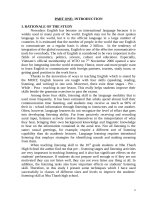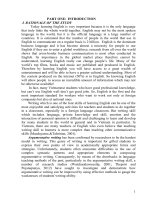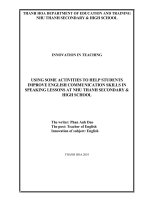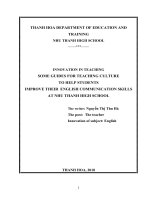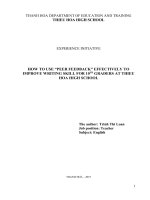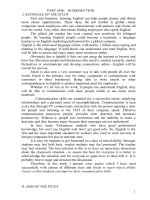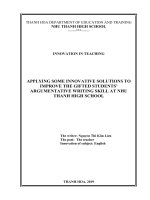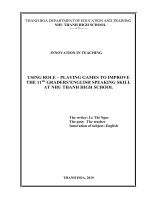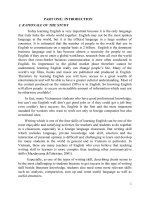Using techniques to improve the students’ english writing skill in describing charts at nhu thanh high school
Bạn đang xem bản rút gọn của tài liệu. Xem và tải ngay bản đầy đủ của tài liệu tại đây (1.3 MB, 23 trang )
PART ONE: INTRODUCTION
I. RATIONALE OF THE STUDY
Today learning English is very important because it is the only language
that truly links the whole world together. English may not be the most spoken
language in the world, but it is the official language in a large number of
countries. It is estimated that the number of people in the world that use in
English to communicate on a regular basis is 2 billion. English is the dominant
business language and it has become almost a necessity for people to use
English if they are to enter a global workforce, research from all over the world
shows that cross-border business communication is most often conducted in
English. Its importance in the global market place therefore cannot be
understated, learning English really can change people’s life. Many of the
world’s top films, books and music are published and produced in English.
Therefore by learning English you will have access to a great wealth of
entertainment and will be able to have a greater cultural understanding. Most of
the content produced on the internet (50%) is in English. So knowing English
will allow people to access an incredible amount of information which may not
be otherwise available!
In fact, many Vietnamese students who have good professional knowledge,
but can’t use English well don’t get good jobs or if they could get a job they
even couldn’t have success. So, English is the first and the most important
standard for workers who want to work not only at foreign companies but also
at national ones.
Writing which is one of the four skills of learning English can be one of the
most enjoyable and satisfying activities for teachers and students to do together
in a classroom, especially in a foreign language classroom. But writing skill
which includes language, private knowledge and skill, emotion and the
interaction of personal opinion is difficult and challenging to learn and develop
for many students in the world in general and in Vietnam in particular. In
Vietnam, there are many teachers of English who even believe that teaching
writing skill to learners is more complex than teaching other communicative
skills (Mazdayasna &Tahririan, 2001).
Especially, as one of the types of writing skill, describing charts seems to
be the most challenging to students because to get success in this type of writing
skill beside literature knowledge, students also need some more relevant skills
such as: analysis, comparision, sum up and some useful language as well as
useful structures.
1
At Nhu Thanh High school, my students often see writing skill as hard
work, boring, unrewarding, and not a lot of fun. Typically, they often get stuck
in describing a chart.
Therefore, in this study I present some techniques which I have used
successfully over the last few years with classes of different sizes and levels to
improve the students’ writing skill in describing charts.
II. AIMS OF THE STUDY
I do the research to know about the fact of teaching and learning writing skill
in Nhu Thanh High School more clearly. This study also investigates whether
the techniques can have positive impact on writing process among students and
can develop their writing skill or not. Bearing in mind, I decide the research
with title “Using techniques to improve the students’ English writing skill in
describing charts at Nhu Thanh High School”.
III. RESEARCH QUESTIONS
This study aims at finding answer to the following research question:
How can the techniques help the students at Nhu Thanh High School improve
their describing charts skill?
The question has been addressed to the two classes of two levels (11A3 and
12C6 of the school year 2018-2019 ) that I have been teaching in Nhu Thanh
High School with the aim to examine how the techniques affect the process of
writing here.
IV. SCOPE OF THE STUDY
This study aim to teach writing skill in a systematic way, because it is
experience for teaching as well as for practice. The study investigates using
techniques to help teachers present their writing lessons in describing charts
more clearly and help students practice more successfully so that they can
improve their writing skill.
V. METHODS OF THE STUDY
In this study, I use some research tools to collect and analyze the needed data:
-Recording is used to record the process and the result of using the techniques.
-The second tool used in this study is interviews with students at the end of the
research to study whether using the techniques in English writing lessons of
describing charts is really suitable and comprehensible for them or not.
2
PART TWO: DEVELOPMENT
CHAPTER 1: LITERATURE REVIEW
I. OVERVIEW OF WRITING SKILL INCLUDING DESCRIBING
CHARTS
Lannon (1989) claims that writing is a process delivering meaningful
messages and including its own specific goal. This process requires students to
work hard instead of regarding it as an uncomplicated act (Byrne, 1988).
However, in language teaching and learning process, Tribble (1996, p.3) defines
writing as a language skill that involves “not just a graphic representation of
speech, but the development and presentation of thoughts in a structured way”.
This means writers need to arrange their ideas logically and systematically.
Describing charts is a special kind of writing. Here students have to work on
numbers and charts in bar, pie or line shapes. They have to use their own words
to express the trend, the difference or the changes of the items in the charts in
the ways to give the readers a clear imagination and comprehension of the
charts
Some of the difficulties associated with the teaching of writing in foreign
language classes come from the nature of writing itself. Writing is an artificial
activity in a way that speech is not; while every normal human being on this
planet learns, eventually, to talk and to listen, far fewer people become literate,
able to write. Writing is learned, while speaking is acquired as part of growing
up.
Describing charts is indeed difficult, for several reasons. Firstly, the writer has
to decide what information the reader needs on the chart, and how best to
express this. So there is a psychological difficulty, in that the writer cannot
consult the reader- the audience is not immediately present, in contrast with
most conversations. Writer has no immediate feedback to let them know how
they are doing and whether they should change their approach. There is no
immediate interaction between the producer and receiver. Secondly, there is a
linguistic difficulty, in that the language used in describing charts is different in
most ways from that used in speech or in other kinds of writing.
In schools, writing is taught partly as a vital part of literacy program, but also
in order to show that work is being done. Writing is often associated,
particularly in weaker students’ minds, with “chores” or even with discipline
(the traditional writing lesson is quite quiet, so the teacher is easily able to keep
control). This “homework syndrome” can lead to students making less and less
3
progress because they are poorly motivated, perform badly, receive low grades,
and end up disliking writing more and more.
II. THE REASON WHY DESCRIBING CHARTS IS DIFFICULT
By its nature, writing, especially describing charts is often a solo activity, done
silently, involving physical effort and taking a lot of time. This may not make it
attractive to learners or teachers as a classroom activity. In addition to this,
describing charts is difficult, there are linguistic, psychological and cognitive
problems involved, making teaching it and learning it a considerable challenge.
It is also important to remember that many people never write anything of any
length in their daily lives, or anything using paper and a pen, or without using a
spellchecker. But this is often what we ask them to do in English.
CHAPTER 2: PRACTICAL SITUATIONS
I. METHODS OF THE STUDY
The research is done qualitatively in the context of two English classes 11A3
and 12C6 of the school year 2018-2019 at Nhu Thanh High School). In this
survey, I use the survey questionnaire for students. This survey is designed to
collect information for the study on “An investigation into the Reality of
teaching and learning English writing skill at Nhu Thanh High School.
II. THE REALITY OF TEACHING AND LEARNING ENGLISH WRITING
SKILL AT NHU THANH HIGH SCHOOL
The whole procedure of teaching and learning is implemented similarly to all
students of the class after all of them give consent to be part of the research.
However, due to the limit of the study, I only focus to collect information from
the learning engagement of two classes 11A3 and 12C6 of the school year 20182019 at Nhu Thanh High School) during this process as the data for analysis.
Below is the survey of the practical situation of learning English writing skill on
describing charts at Nhu Thanh High School.
4
Survey no.1
Practical Situation of learning English writing Skill at Nhu Thanh High
School.
Questions for
students
1. Which of these
four following
types oof writing
do you think the
most difficult ?
2.which items in a
writing lesson of
describing charts
makes you the
most difficult?
3. What do you
think of your
writing classes of
describing charts
at Nhu Thanh
High School?
4. What do you
think of the
materials used for
writing skill about
charts at Nhu
Thanh High
School?
A
B
C
D
Description
10%
discussion Argument
20%
25%
Describing
charts
45%
Kinds of
chart
12%
Analyzing
the chart
16%
Using
language
suitably
25%
Really
interesting
3%
Interestin
g
7%
Deciding
which is
essentil
information
47%
Boring
41%
Difficult
and boring
51%
Difficult
but
interesting
8%
C. Interesting
and
stimulating
9%
Easy and
boring
32%
Really
boring
49%
From the survey number 1, we can see that writing about charts is often done
silently at Nhu Thanh High School, this may not make it attractive to learners as
a classroom activity. The students often see describing grraphs as hard work,
boring, unrewarding. Moreover, students are poorly motivated so they dislike
being involved in writing activities about charts.
In addition to this, one problem in the writing classes is that some teachers feel
difficult to present clear steps to help students feel more motivated and easier to
5
do the task. Therefore, both teachers and students don’t feel willing to engage in
writing lesson about graphs.
CHAPTER 3:
TECHNIQUES TO IMPROVE THE STUDENTS’ ENGISH WRITING
SKILL IN DESCRIBING CHARTS
I. RECOMMENDATIONS
According to the data analysis from the survey, it can be personally concluded
that the most important feature that makes my students to engage more in the
lesson is the kind of assessment which forces them to learn although the
meaningfulness of tasks also more or less affect the level of engagement
the most meaningful tasks to my students are tasks that can help them to pass
the tests at the end of the semester not tasks that give them reasons to
communicate as I expected. For them, the most motivating task is also easy and
clear enough. But all the writing lessons about charts are complex and
challenging and not for the final tests or exams so the sudents all think
themseves it isn’t necessary to learn describing charts.
Therefore, I have used some techniques to improve my students’ writing skill
n describing charts.
Using games is one of the most important ways to teach efficiently in a
language class. Games mean the world to children. Nothing is more fun than
playing games for them because they feel happy and free while playing.
Remember when you were young, you will remember the games you played
and the happiest moments of your life.
It does not matter indoor or outdoor, we can not deny the importance of games.
If students learn with games, have fun, feel happy and free, it means that you
have reached your goals. Games strengthen language skills, besides learners
develop social skills and good relationships while they interact with each others.
Whatever your goal is(speaking, grammar points, vocabulary, writing, etc.) you
must believe that every game you have students play, is much more useful than
tons of exercises and worksheets and you get more positive results than
anything else.
II. PRACTICAL SOLUTIONS: USING TECHNIQUES.
1. Giving a clear format:
6
1.1.
Write an introduction to the topic of the graph in your own words
(content+ place+ time) by rewording it.
1.2.
Give an overview of the main ideas in the graph. (most general
trend/difference…)
1.3.
Describe the most important changes and numbers. Remember to include
relevant comparison.
2. Illustrating how to carry out the three above steps.
2.1.
How to reword the introduction:
2.1.1: Giving some examples:
Eg 1: The chart shows information about visitors to Australia, 2000-2008.
The graph illustrates/provides information/data about how many
people visited/ the number of people who visited Australia over an
eight-year period between 2000 and 2008.
Eg 2: The graph shows data about the annual earnings of three bakeries in
London, 2000-2010
The graph highlights data about the amount of money which was earned /
how much money was earned by three bakeries in London from 2000 to 2010.
2.1.2: Giving some topics then asking the students to practise:
Write the introduction in two ways using how much/howmany, the number
of/the amount of
1. Unemployment rates, India and Brazil, 1995-2000
2. DVD sales, UK and USA, 2005-2008
3. Chocolate production, Colombia, 1997-2000
4. Gas production in Russia , 2003-2008
5. Employment rates in the public sector, UK, 2006-2010
2.2.
How to write an overview:
- Possible sentences: representing some models of sentences used to write
an overview for discribing a chart:
There was a (significant) upward/downward trend in …..
……saw/witnessed a (considerable) fall over the period.
7
……fluctuated significantly over the period.
- Some examples
Ex1: Overall, what stands out from the graph is that there were considerable
upward trends in the income of both Bernie’s Buns and Robbie’s Bakery, while
the earnings of Lovely Loaves saw a substantial fall over the period in question.
8
Ex2: In general, it can be seen that the income of Bernie’s Buns and
Robbie’s Bakery rose whereas the income of Lovely Loaves went down
significantly over the time period covered by the graph.
Ex 3:Overall it can be seen that Bernie’s Buns is generally the busiest
bakery, outselling Lovely Loaves in six out of eight items. On the whole,
savoury foods such as toasted sandwiches , salads and fresh loaves are
not as popular as sweet items like cakes and cookies.
2.3: How to write the details:
- Focus on the small changes or visible trends or the various differences in
fingures.
-Analyse the data to show the paticular view.
- Use a variety of comparison structures and expression structures to describe
the charts.
3: Languages to describe changes or differences:
3.1: Verbs:
Verbs
Increase
Big increase
Decrease
9
Inprove, increase,
rise, grow, go up
Rocket, shoot up,
jump, soar, surge,
double
Fall, decline,
decrease, drop, go
down
Ex: Asks the students to put a suitable verb in each blank based on the two
charts above:
The income of Burnies’ Buns …….between 2006 and 2008.
The amount of money earned by Robbies’ Bakery …..between 2008 and 2010.
Earnings of Lovely Loaves ….between 2004 and 2005.
The income of Robbies’ Bakery ……during the first five year of the period.
3.2: Adverbs:
Adverbs
Big change
Fast change
Small change
Dramatically/
significantly/
considerably
Rapidly/sharply
slightly/
negligibly
/marginally
3.3: Nouns:
a rise, a fall, a decline, a soar, an increase, a drop, a fluctuation, a plunge, a
decrease, a dip, a recovery, a jump, a growth.
3.4: Adjectives:
dramatic, steady, considerable, negligible, remarkable, gradual, significant, …
3.5: Other expressions:
Fluctuate, level off, hit/reach a peak, dip, recover, remain stable, hit a trough,.
3.6: Structures:
-
Comparative
-
Superlative
-
X is not as + adj + as + Y
-
X is nowhere near as + adj + as + Y (big difference)
-
X is not nearly as + adj + as + Y
-
X is almost as + adj + as + Y (small difference)
-
X is not quite as + adj + as + Y
10
-
Not verb + as NP + as
-
X is + three times/ twice/ half + as adj + as + y
Examples:
.
Monster Records- 230,000 CDs, 1990- Crooner- 225,000 CDs
→ Monster Records sold more CDs than Crooners in 1990.
→Crooners did not sell as many CDs as Monster Records in 1990, with 225,000
compared to 230,000.
→ Monster Records was more successful than Crooners ..
→ Crooners was not as successful as Monster Records
→ Crooners was almost/not quite as successful as Monster Records
3.7: Structures to vary expressions:
-
There was a/an + adj + N…
-
S + witnessed/saw/experienced + a/an + adj + N
Ex: Vary the expressions:
. Sales of DVDs in the UK rose sharply between 2001 and 2004.
→There was a sharp rise in sales of DVDs in the UK from 2001 to 2004.
→Sales of DVDs in the UK experienced a sharp rise between 2001 and 2004.
→The number of DVDs (which were) sold in the UK shot up…
Giving some more sentences and asking them to vary them:
. Chocolate production in Colombia saw a significant fall.
. There was a steady growth in average incomes in Europe between 1998 and
2004.
. The amount of chocolate I ate before my IETLS exam rose dramatically.
3.8:Linking phrases:
-
As regards
-
Regarding
-
If we look at
-
As for
11
-
With respect to
-
Looking at the details,
-
By contrast,
-
Overall, in general, on the whole
-
After that, and then, following this, at this point, subsequently, next.
-
While, whereas
Ex: Example
Looking at the details, as regards Burnie’s Buns, income started at $20,000 in
2000, after that there was a fluctuation over the next three years, at which
point it levelled off at just under $40,000 until 2006. Next the figure went up
significantly to $60,000 in 2008. Subsequently, income rose gradually and
finished at …If we look at Robbie’s Bakery, the trend was similar.
3.9:Prepositions:
- Use AT with start and finish
- Use TO with increase and decrease
- Use AT with remain stable and level off
- Use AT with peak
- Use BY to describe how much sth increases or decreases
- Use BETWEEN … AND…to describe the range of fluctuation
Ex: As regards Robbies’ Bakery, income started at $55,000 in 2000 and
remained stable this figure until 2005. At this point, there was a sharp rise to
$70,000. Between 2007 and 2008, the figure went up around by $30,000 from
$70,000 to nearly $100,000. Finally, income grew gradually and peaked at
$105,000 in 2010. If we look at Lovely Loaves, earnings fluctuated between
$80,000 and $90,000 in the first five years. And then there was a sharp fall to
$40,000 in 2008. Finally, the figure levelled off at $40,000 and finished the
same figure.
3.10: Express numbers:
50%- a half of/ one in two/ one out of two/ one out of every two.
25%- a quarter of/ one in four/ one out of four/ one out of every four.
75%- a thirds of/ three in four/ three out of four/ three out of every four.
12
10%- one tenths of/ one in ten/ one out of ten/one out of every ten.
40%- ……
33.3%.........
20%..........
64%.........
32%..........
3.11:Ranking
list/ one/ place
-
In first/second/last………….was X
-
Top/bottom of the ……….was
-
The number ………activity is X
-
X was ranked second with
-
First/last on the ……was X
-
X headed the …..with
-
Ranked in third ….was X
-
The most/ second most/least popular is X
-
Next came X
-
This was followed by X
4. Practice:
decribe the following chart in about 80 words.
Giving a full example of writing:
13
Suggested answer:
The chart presents why people from other countries go to New Zealand.
Overall, the majority of visitors go for pleasure, not for work.
The largest percentage, 47 percent, go there on holiday. Twenty nine
percent visit New Zealand in order to see friends and family. Thirteen percent
go there on business, and just over a tenth visit for other reasons.
III. SOME PRACTICAL EXAMPLES OF APPLYING THE ABOVE
TECHNIQUES IN THE WRITING LESSON OF DESCRIBING CHARTS
AT NHU THANH HIGH SCHOOL.
Example 1: Unit 7- English 11
Applied lesson:
Applying the techniques for the pre-writing stage.
Unit 7- English 11
(write about a friend)
With the whole class,
brainstorm
nouns,
adjectives and verbs to
14
do the task. Students
can select the words
from chater three, II,
3.
Write these above the
central word.
Then ask for verbs and
write them below the
central word. Ask for
adjectives and write
on the right and left of
the word.
And then select the
right structures to
express the ideas.
I ask students to work
in groups of six or
seven:
some
are
responsible
to
introduction
part( rewording the
requirements). Some
take responsibility to
writing
an
overview( focusing on
the main trends or
differences).
And
some others write the
The eleventh graders (11 A3, school year: 2018details( look at and
describe the detaills of 2019) were discussing describing the chart.
the charts.
After that, ask the
groups to collect the
three different parts
from the members to
make a full writing.
Ask
some
of
the
15
leaders
or
representatives of the
groups to report their
writing or write it on
the board.
Gives feedbacks
A student are writing her description on the board
The 1st Group’s writing sheet
Example 2: Unit 15- English 12
Applied lesson:
Applying the technique for the while-writing stage.
Unit 15- English 12
With the whole class,
brainstorm
nouns,
adjectives and verbs to
do the task. Students
16
can select the words
from chater three, II, 3.
Write these above the
central word.
Then ask for verbs and
write them below the
central word. Ask for
adjectives and write on
the right and left of the
word.
And then select the
right
structures
to
express the ideas.
I ask students to work in
groups of six or seven:
some are responsible to
introduction
part( rewording the
requirements).
Some
take responsibility to
writing
an
overview( focusing on
the main trends or
differences). And some
others
write
the
details( look at and
describe the detaills of
the charts.
After that, ask the
groups to collect the
three different parts
from the members to
make a full writing.
The twelfth graders (12C6, school year: 2018-2019)
Ask some of the leaders were discussing describing the chart.
or representatives of the
groups to report their
writing or write it on the
17
board.
Gives feedbacks
Lê Khánh Ly (12C6) was reporting her group’s
writing.
The 4th group’s writing sheet
18
CHAPTER 4: RESULT
In conclusion, using a clear technique is an efficient way to teach English in
the classroom. This way I get the best results in the classroom. It arises students’
understanding. Having understand clearly, students can do the tasks efficiently.
At first, students always find it strange and challenging to describe a chart in
English. However, with the given guides above, they hve a positive attitude to
do the tasks and they are more willing to write. The following is the result chart
of class 11A3 and class 12C6:
Before using techniques in After using techniques in writing
writing skill.
skill
Class
Excellent Good Fair Poor
(%)
11A3
2,2
4,3
12C6
(%)
10,9
15,2
(%)
Excellent
good
(%)
(%)
(%)
36,1 50,8
31,9 48,6
Fair
(%)
poor
(%)
10,3
28,7
34,8
26,2
14,3
34,2
35,7
15,8
15
30
30,5
24,5
16,4
37
33,5
13,1
PART THREE: CONCLUSION AND REFLECTIONS
I. CONCLUSION
To sum up, the research has brought to me some important lessons of English
writing teaching and learning in general and of working with my students in
particular.
Firstly, the research affirms for me that writing techniques are the first things
that students want to have in a writing lessons. It is not because in the activities,
students have opportunities to choose the texts of their own interest and at their
own level of proficiency but also because writing techniques give them an easy
way of writing in which they are not in pressure to write. Thus, they can
comfortably improve their English writing of describing a chart fluency.
19
It is also proved by the research that students are more engaged in the writing
activities when the tasks are more meaningful to them. More specifically, in my
case that means the tasks that give my students a more meaningful reason to
complete engage them more.
We can not deny the importance of techniques. If students understand
enough, have clear steps, feel confident and motivated, it means that you have
reached your goals.
II. REFLECTIONS
This study has given me a chance to know more about my students, about what
goes wrong with them when they are not engaged in my writing class. In the
study, I also have chance to access a number of researches of many experienced
language educators and teachers, from which I obtain new knowledge of
language teaching and learning in general and knowledge of meaningful tasks in
teaching writing in particular.
During the research, I also learn more about the methods of doing research in a
scientific way. Firstly, I learn to look at the situation of my English teaching and
learning critically and make research questions with the hope of improving it. I
also learn to arrange and organize my ideas and my work systematically to fit
the timetable of the research procedure. But the most important thing is that I
learn how to put my background knowledge into the knowledge repertoire of
related previous studies to have a broader view of the situation and to make my
research skills (such summarizing and synthesizing) useful by activating them
creatively and critically.
Thanh Hoa, the second of May, 2019
The Headmaster’s identification
I ensure that this study has been written by
20
me
The writer
Đỗ Thị Thảo
21
REFERENCES
1. Brown, J.D. (1994). Research methods for Applied Linguistics: Scope,
characteristics, and standards. In A. Davies & C. Elder (Eds.), The handbook of
applied linguistics (pp. 476-500). Oxford: Blackwell.
2. Byrne, D. (1988). Teaching writing skills. Longman: London
Creswell, A. (2000). Self-monitoring in student writing: developing learner
responsibility. ELT Journal, 54(3).
3. Frankenberg – Garcia, A. (1999). Providing student writer with pretext
feedback. ELT Journal, 53 (2).
4. Gipps, C (1994). Beyond Testing: Towards a Theory of Educational
Assessment. London: The Falmer
5. Gabe, W. & Kaplan, RB. (1996). Theory and practice of writing. The USA:
Long Man.
6. Charles Hadfield and Jill Hadfield.(1990). Writing games. Longman.
22
23
